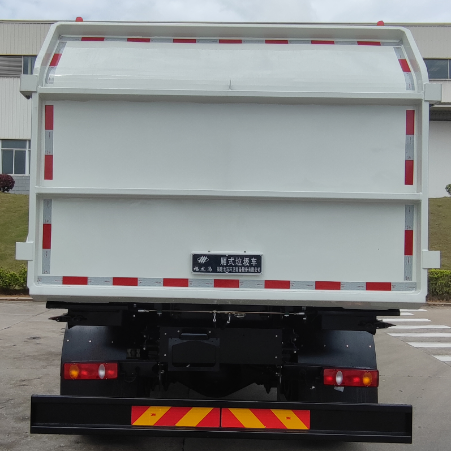As cities worldwide grow larger and more congested, the need for sustainable solutions becomes increasingly urgent. Traditional waste collection methods, reliant on diesel-powered vehicles, contribute significantly to urban pollution. In contrast, electric rubbish trucks offer a greener alternative, producing zero emissions and significantly reducing noise pollution. Their adoption is a step toward achieving cleaner air and quieter streets, making cities more livable.
This article aims to explore the multifaceted benefits of electric rubbish trucks, the cutting-edge technology that powers them, and their potential to shape the future of waste management. By delving into the evolution of waste collection, the advantages of electric vehicles, and the challenges ahead, we hope to provide a comprehensive understanding of this transformative movement.

The Evolution of Waste Management
Waste management has evolved significantly over the years. Initially, waste collection was a rudimentary process, with manual laborers handling trash without any specialized equipment. With the industrial revolution came mechanization, leading to the development of the first motorized garbage trucks. These vehicles improved efficiency but brought new challenges like air and noise pollution.
In recent decades, environmental awareness has driven the search for cleaner solutions. Hybrid trucks and biofuel-powered vehicles have made strides, but it is electric rubbish trucks that hold the promise of a truly sustainable future. These trucks utilize advanced battery technology and electric motors to operate quietly and efficiently, representing a significant leap forward in waste management practices.
Benefits of Electric Rubbish Trucks
Electric rubbish trucks offer numerous advantages over their diesel counterparts:
- Environmental Impact: Electric trucks produce zero emissions, reducing the carbon footprint of waste management. This contributes to cleaner air and a healthier environment for city dwellers.
- Operational Efficiency: Electric motors are more efficient than internal combustion engines, leading to lower operational costs. Maintenance costs are also reduced, as electric engines have fewer moving parts and require less frequent servicing.
- Noise Reduction: The quiet operation of electric rubbish trucks significantly reduces noise pollution in urban areas. This is particularly beneficial for residential neighborhoods and city centers, where noise levels can be disruptive.
- Energy Independence: Electric rubbish trucks can be charged using renewable energy sources, further decreasing reliance on fossil fuels and enhancing energy security.
Key Features of Electric Rubbish Trucks
Electric rubbish trucks are equipped with cutting-edge technology that sets them apart from traditional vehicles:
- Advanced Battery Technology: Modern electric trucks use lithium-ion batteries, known for their high energy density and long lifespan. These batteries provide sufficient power for a full day of operation and can be recharged overnight.
- Regenerative Braking: This technology allows electric rubbish trucks to recover energy during braking, increasing efficiency and extending the range of the vehicle.
- Smart Technology: Many electric rubbish trucks are equipped with GPS routing, automated waste collection systems, and data analytics tools to optimize collection routes and schedules, reducing fuel consumption and improving service efficiency.
The Future of Waste Management
The transition to electric rubbish trucks represents a significant step toward a more sustainable future. As technology advances and infrastructure improves, we can expect to see widespread adoption of these vehicles in cities worldwide. This shift will likely influence urban planning, leading to cleaner, quieter, and more efficient waste management systems.
Additionally, the integration of electric rubbish trucks with other smart city technologies promises to enhance the overall efficiency of urban services. By leveraging data and automation, cities can optimize waste collection, reduce operational costs, and improve the quality of life for residents.

Conclusion
Electric rubbish trucks are paving the way for the next generation of waste management. Their environmental benefits, operational efficiency, and technological advancements make them a crucial component of sustainable urban development. As cities continue to grow and evolve, embracing electric rubbish trucks will be key to achieving cleaner, quieter, and more efficient communities.
FAQs
How do electric rubbish trucks compare in terms of performance?
Electric rubbish trucks generally offer comparable performance to traditional diesel trucks. They provide sufficient power and torque for waste collection tasks, with the added benefits of reduced emissions and quieter operation. Technological advancements continue to improve their efficiency and range, making them increasingly viable for widespread use.
What are the main obstacles to adopting electric rubbish trucks?
The primary obstacles include the high initial cost of electric trucks and the need for an extensive charging infrastructure. However, as battery technology advances and economies of scale are achieved, costs are expected to decrease, making electric trucks more accessible to municipalities.
How long does it take to charge an electric rubbish truck?
Charging times vary depending on the battery size and the charging infrastructure available. On average, it takes 6 to 8 hours to fully charge an electric rubbish truck using a standard charging station, making overnight charging a practical option for many waste management operations.
Are there government incentives for switching to electric rubbish trucks?
Yes, many governments offer incentives to encourage the adoption of electric vehicles, including rubbish trucks. These incentives may include tax credits, grants, and rebates to offset the initial purchase cost, as well as funding for the development of charging infrastructure.
What impact do electric rubbish trucks have on air quality in cities?
Electric rubbish trucks have a positive impact on air quality by producing zero emissions. This reduces the levels of pollutants, such as nitrogen oxides and particulate matter, in urban environments, contributing to healthier air and improved quality of life for city residents.







